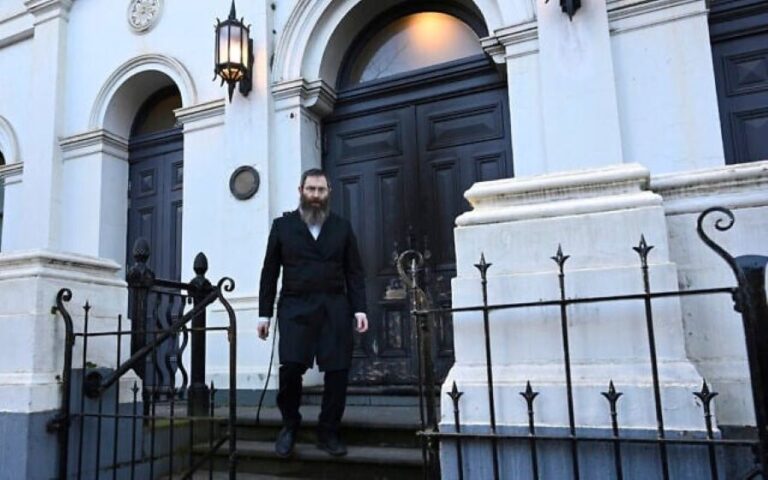 New Jersey Gov. Chris Christie, a likely Republican candidate for president, said Monday that parents should have some choice on whether to vaccinate their children.
New Jersey Gov. Chris Christie, a likely Republican candidate for president, said Monday that parents should have some choice on whether to vaccinate their children.
Christie’s comments, made after a tour of a biomedical research center during a three-day trade mission to the United Kingdom, come as a measles outbreak centered in California has sickened more than 100 people in the U.S.
Christie said that he and his wife had vaccinated their children, describing that decision as “the best expression I can give you of my opinion.” He said they believe doing so is an “important part of making sure we protect their health and the public health.”
“But,” Christie added, “I also understand that parents need to have some measure of choice in things as well. So that’s the balance that the government has to decide.”
A few hours after Christie spoke, his office said in a statement that the governor “believes vaccines are an important public health protection and with a disease like measles there is no question kids should be vaccinated.”
All states now require children to get certain vaccinations to enroll in school, although California and New Jersey are among 20 states that let parents opt out by obtaining personal belief waivers. Parents in New Jersey seeking a medical exemption have to submit a written statement from their doctor or registered nurse indicating why the exemption is needed.
Some people worry that vaccines can cause developmental problems in children, despite scientific evidence disproving any link. Others object for religious or philosophical reasons. The New Jersey health department’s guidelines on vaccines say that objections “based on grounds which are not medical or religious in nature and which are of a philosophical, moral, secular, or more general nature continue to be unacceptable.”
Christie’s comments stand in contrast to those of President Barack Obama, who said in an interview with NBC News that all parents should get their kids vaccinated. Those children who are not, he said, put infants and those who can’t get vaccinations at risk.
“I understand that there are families that, in some cases, are concerned about the effect of vaccinations,” Obama said. “The science is, you know, pretty indisputable.”
The measles-mumps-rubella vaccine, commonly called the MMR, is 97 percent effective at preventing measles, according to the Centers for Disease Control and Prevention. New Jersey requires MMR vaccines for children between 12 and 15 months, and then a second at between 4 and 6 years.
Measles is a highly contagious disease that spreads through the air, with symptoms that include fever, runny nose and a blotchy rash. The current outbreak originated at Disney theme parks last month, and Mexico and at least six other U.S. states have recorded measles cases connected to Disneyland.
When asked by reporters in Cambridge, after touring the facilities of MedImmune, the manufacturer of the flu vaccine FluMist, if leaving parents with the option to pass on vaccinations for their children is dangerous, Christie said there “has to be a balance.”
“It depends on what the vaccine is, what the disease type is and all the rest,” he said. “And so I didn’t say I’m leaving people the option. What I’m saying is that you have to have that balance in considering parental concerns.”
Christie said the conversation about whether to vaccinate needs to include the type of disease at issue. He said “not every vaccine is created equal. And not every disease type is as great a public health threat as others.”
The American Academy of Pediatrics urges parents to get their children vaccinated against measles and other childhood diseases. It says doctors should bring up the importance of vaccinations during visits if parents are reluctant, but should respect a parent’s wishes unless there’s a significant risk to the child.
“In general, pediatricians should avoid discharging patients from their practices solely because a parent refuses to immunize his or her child,” according to guidelines issued by the group.
(AP)











4 Responses
Go to any old cemetery and look for a large children’s section, filled with children who died of contagious diseases that we never hear of today. Then try to find such a large section in any more modern cemetery.
Now, give me any justification for not requiring parents to fully vaccinate their children. Just try.
As it does every winter, the Israeli Health Ministry is campaigning heavily to persuade the public to get vaccinated against the flu. Nearly one and a half million people have taken the shot this season, the ministry says. Yet resistance is rearing its head – among doctors and nurses, of all people.
The underlying irony is that while an overwhelming majority of doctors tout the benefits of inoculation for the general public, only 35 percent of medical practitioners get immunized themselves, the Health Ministry admits.
At least they’re in good company – studies done in Europe and the United States show similar scorn for the shot among doctors and nurses, ascribed to a combination of “personal attitude” and misinformation. At least in the United States, the situation is changing: now due to regulatory changes, somewhere between 80 to 90 percent of healthcare workers get the shot, says Dr. Arnold Monto, professor of epidemiology at the University of Michigan and a global influenza expert.
Israel’s “vaccine refuseniks” cite a twofold rationale: they don’t believe they’re likely to get sick, and they don’t like being told what to do.
“Personally, why don’t I take the shot? Because it’s my version of anarchism,” says one physician in Jerusalem, who spoke on the condition of anonymity. The shot makes him feel sick for days, he adds: Why be sick now rather than take the chance of being sick a few days, later?
Maybe because when it gets bad, influenza can kill. The Jerusalem physician however shrugs that he doesn’t belong to a high-risk group, and, he points out, he encourages his family to get the shot.
Flu shots do matter
Medical experts consider immunization, with an attenuated or inactive virus, to be the best way to prevent the spread of influenza. It’s particularly important for people with weaker immune systems, like seniors and children..
One problem with immunizing against influenza is that the flu virus mutates madly, even making inter-species jumps – from animals to humans and vice versa. No one vaccine acts against all strains of flu, and one that worked last year may not work this one. “The influenza vaccine is good, it’s not great..”
The most feared security threat
In a paper published in 2007, the World Health Organization called influenza pandemics “the most feared security threat.”
..
It’s happened before. In 1918-1919, the so-called “Spanish Flu” pandemic affected approximately one-third of the world population, according to the CDC, resulting in between 50 to 100 million deaths. Today mankind is armed with better knowledge and vaccines, too. But pandemic could recur under the right conditions.
Influenza-related diseases kill 1,386 people a year in Israel, on average..
Yet doctors and nurses still shun the shot, whether because they mistakenly figure they’re immunized by sheer exposure – or because they don’t feel like it.
Don’t shame me, I’m a doctor
Some Israeli hospitals and medical centers urge doctors to wear stickers that read “I also got vaccinated for the flu.”
In October, the Ethics Committee of the Israeli Medical Association took a position against the stickers, on the grounds that they were counter-productive. Their use is tantamount to peer pressure to get immunized (and wear the sticker), which could actually diminish the doctors’ willingness to actually get the shot, the IMA wrote.
“It makes you feel not respected,” says one pediatrician who works in the Tel Aviv area. “There needs to be a good reason to get immunized. You need to convince me. But to shame me? I’m a doctor.”
On the global stage, Israel is lauded for its efforts on behalf of vaccinating the public: It is one of few places in the world that has such an active campaign to promote vaccination, says Monto. But Israeli health care workers are free to give reign to their libertarian streak, placing a premium on their individual freedom over the collective good.
In terms of flu and the flu shots. The best remedy against the flu is to get a good night sleep, dress warmly in the winter BEFORE going outside and make sure to heat a well-balanced, healthy meal. That’s what I’ve done for years and it’s worked wonders for me (I used to get the flu multiple times a year – no more).
This year I DID get the flu shot. I then stayed up late one night and got only a few hours sleep — next thing I knew I had the flu.
OneMoreView:
Before you stayed up that one night, you had already caught the flu, but it was incubating inside you and the symptoms hadn’t shown up yet.
While eating a healthy diet and getting enough sleep as well as exercise and tefillah (which is the best medicine) are always helpful, your anecdote about the flu just doesn’t jibe with the facts.